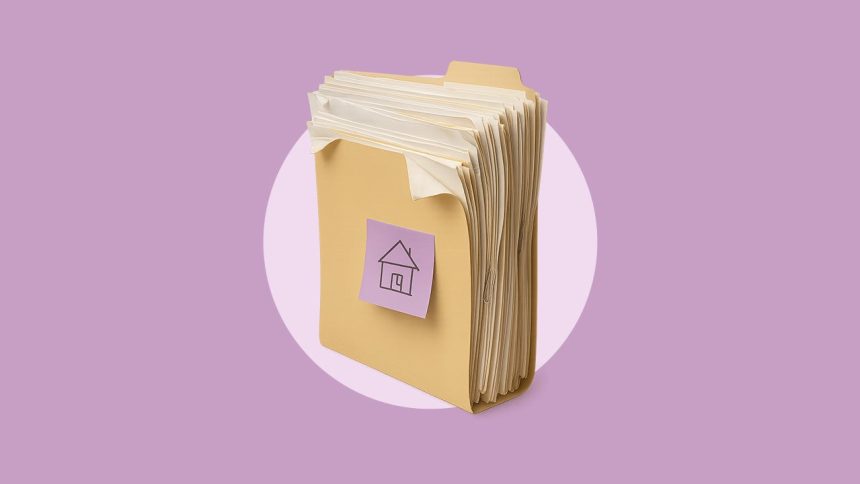Image & Illustration by Bankrate
Key takeaways
- Applying for a mortgage and closing on a home can involve a mountain of paperwork.
- Documentation needed typically includes in-depth information about your finances, such as pay stubs, tax returns and bank statements.
- To avoid delays, it’s important to keep it all organized — especially during the underwriting process and as you approach closing.
Buying a house is no small undertaking, and neither is compiling the mountain of paperwork necessary to complete the transaction. If you need a mortgage to purchase your home, your lender will want to look over a wide variety of personal and financial documents to assess your credit-worthiness — and that’s before you even get to the offer and the closing. Read on to learn about all the documents you’ll need to make the process as speedy and stress-free as possible.
What documents do I need to buy a house?
You will need a slew of documentation throughout the entire homebuying process, with access to different documents at various stages of the transaction. In short, be ready to prove your employment status and income, and to provide detailed documentation of all your debts, savings and assets.
Lining up the paperwork needed before you actually start the process will help you remain organized throughout. The documents you need are likely to include the following (and possibly more):
- Recent tax returns
- Recent W-2 forms
- A letter from your employer stating your employment status
- If self-employed, business tax returns and profit-and-loss records
- Bank statements
- Retirement and brokerage account statements
- Student loan and/or car loan statements
- Credit card statements
- Asset titles, including your current home(s) and vehicle(s)
- History of residence (an informal list of your addresses for the past several years)
- Proof of any additional income aside from your annual earnings, such as alimony, Social Security, bonuses, etc.
- A gift letter, if applicable
- Government-issued photo ID
Documents needed as you start the buying process
A great first step is to get a sense of what your credit report looks like. A minimum credit score of 620 is typically needed to qualify for a mortgage loan, though some loans have lower minimums. The higher your credit score, the better mortgage rate you’re likely to be eligible for. If your credit is suboptimal, it’s good to know that in advance — give yourself a bit of time to raise that number before applying for the loan.
Similarly, if you’ve been less-than-punctual in filing your taxes over the years, now is the time to fix that. To secure home financing, you’ll need to provide at least a couple of years worth of tax returns, or possibly more. Make sure you have them before starting the process. “If you haven’t been filing your taxes, that’s number one — start there,” says Trenesha Harrison, broker/owner and Realtor at Oklahoma’s iLove Realty.
Documents needed for preapproval
Mortgage preapproval is where the plot thickens in terms of paperwork. Be prepared to provide documentation proving the following for each borrower on the loan:
Proof of identity
- A driver’s license, Social Security card or passport
- A list of all residential addresses over the past several years
Proof of employment
- Pay stubs for at least the past 30 days
- W-2 or self-employment tax returns for the past two years
- A list of employers over the past several years
Proof of income
- Bank statements dating back a minimum of 60 to 90 days for all accounts (checking, savings, etc.)
- Business banking and related records, if self-employed
- Documentation supporting any income other than your employment earnings
Assets
- Statements for investment, trust, retirement and other financial accounts
- Proof of ownership for any vehicles or other real estate holdings
- If a third-party gift is serving as part of your down payment, a copy of the gift letter
Debts
- Statements dating back 60 to 90 days for any credit card, auto loan, personal loan and/or student loan accounts
Credit history
- A copy of your credit report
- Your rental history, if applicable: proof of payment on any leased apartment, house or car
Mortgage preapproval will give you an idea of how much you can borrow, and it also helps show home sellers that you are a serious and qualified buyer. Keep in mind, though, that you may not want to spend the full amount you are preapproved for — there are plenty of other costs associated with buying a home, and you need enough cash to cover it all.
Documents needed in the offer process
Once you’ve found a home and you’re ready to make an offer, you’ll need — you guessed it — more paperwork. Specifically, proof of earnest money.
This deposit, which a buyer puts down to prove their intent to buy the home, is typically paid when the purchase agreement is signed. It is held in escrow until closing, when it gets applied toward the payment. The amount is usually 1 percent of the home’s purchase price (for example, $3,500 for a $350,000 home). You will need to have this money ready to go prior to signing your contract, so be sure it is liquid and easy to access.
Documents needed to close
There are many documents involved at closing, both legal and financial. If you are working with an agent and/or a real estate attorney, they will likely gather together the paperwork needed on your end of the transaction. Closing documents include, but are not limited to:
- Proof of homeowner’s insurance
- Closing disclosure
- Loan application
- Copy of purchase contract
- Certificate of occupancy, in the case of a new-construction home
The closing is also where money will formally change hands — be sure you know in advance how much and to whom, so you can have cashier’s checks or certified checks in-hand.
Documents needed after closing
If you are not working with a real estate agent or attorney, be sure these documents also make it to the closing table. You’ll want to ensure they are accounted for once closing paperwork is signed.
Find a real estate agent
Working with an experienced real estate agent can take a lot of the pressure off you when it comes to ensuring that all your paperwork is in order. Having a seasoned professional on your side is invaluable, especially as you make an offer and prepare for closing. Your agent will know which documents are needed at what stages of the process, and he or she can guide you along the journey every step of the way.
FAQs
Why we ask for feedback
Your feedback helps us improve our content and services. It takes less than a minute to
complete.
Your responses are anonymous and will only be used for improving our website.
Help us improve our content
Read the full article here















